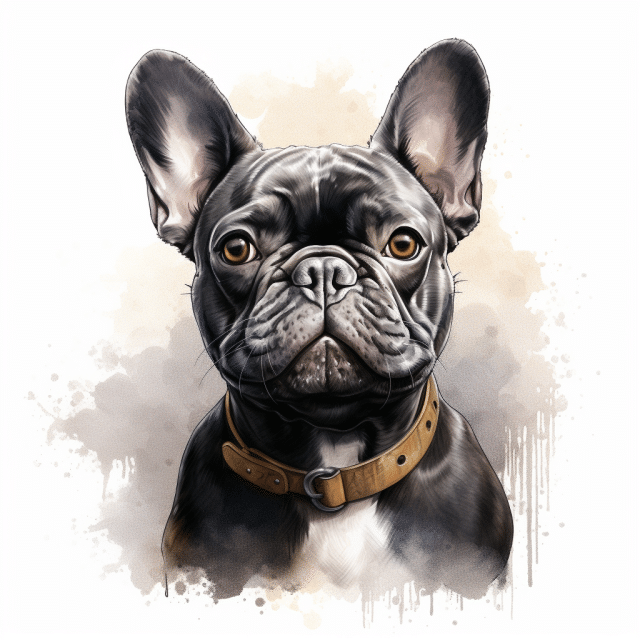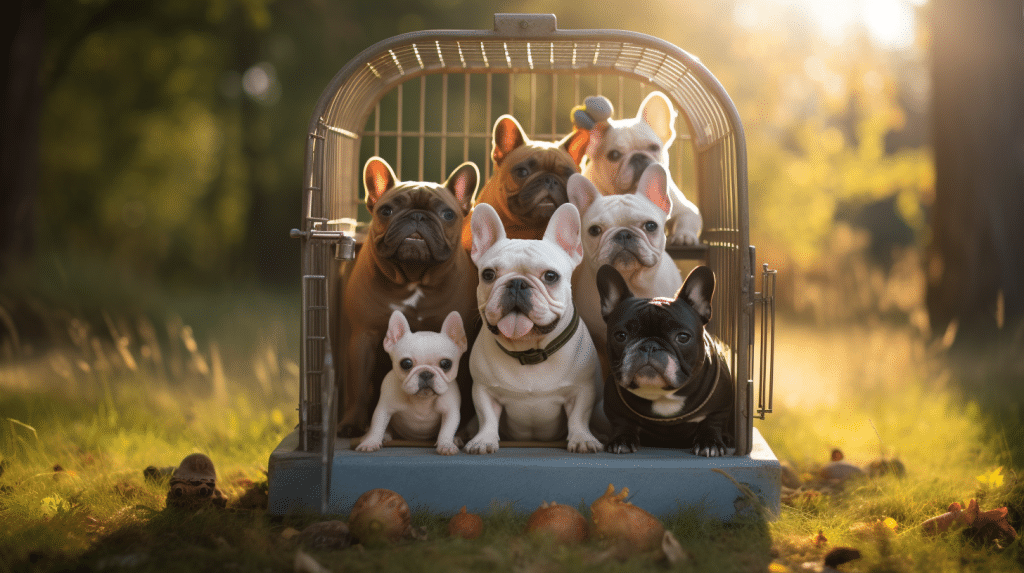Why You Should not Buy a French Bulldog? “Did you know 80% of French Bulldogs are born through C-section due to their disproportionate bodies? While they’re undeniably cute, owning one isn’t as simple as it seems. You might face health issues, unexpected costs, and ethical dilemmas. Not to mention, they might not fit into your family as you’d hope. So let’s delve into why you shouldn’t rush into buying a French Bulldog and consider other pet alternatives.
Understanding the Health Problems of French Bulldogs
You’re now delving into the various health issues that a French Bulldog can face. The first one to be aware of is Bulldog allergies. Just like humans, Bulldogs can suffer from allergies, which can be triggered by anything from food to environmental factors like dust or pollen. Common signs of allergies include itchiness, redness, and swelling. It’s important to recognize these signs early and consult with a vet to manage the symptoms and prevent more serious complications.
Next up is Brachycephalic syndrome. This is a condition common in flat-faced breeds like the French Bulldog. It can lead to breathing problems, as the dog’s short nose and flat face often mean narrower airways. Symptoms can range from snorting and noisy breathing to more severe issues like fainting from lack of oxygen. It’s a serious condition that requires veterinary attention.
Lastly, lifespan concerns. French Bulldogs generally have a shorter lifespan, typically 10-12 years. This is quite a bit shorter than many other dog breeds, so it’s something to keep in mind. They’re also prone to other health issues that can shorten their lifespan, including hip dysplasia and heart disease.
While these health issues might seem daunting, with the right care and attention, a French Bulldog can still live a happy, fulfilling life. However, it’s important to be fully informed before deciding to bring one into your home. It’s not just about the cute face and playful attitude, but also about being prepared for the potential health problems they may face.
The Hidden Costs of Owning a French Bulldog
You’re not only dealing with health issues when owning a French Bulldog, but you’re also facing hidden costs that can strain your budget. Despite their small size and adorable faces, these dogs can rack up hefty bills, which may come as a surprise to many potential owners.
Two major costs you’ll encounter include:
- Grooming expenses
- Regular cleaning of their folds to prevent infections
- Periodic nail trims and ear cleanings
- Insurance premiums
- Monthly payments that can escalate quickly
- Often necessary due to the breed’s health issues
Aside from these, you may also face unexpected vet bills. French Bulldogs are prone to many health issues, some of which may require emergency care or expensive treatments. These can quickly add up and take a serious toll on your finances.
Owning a French Bulldog is not just about the purchase price, but also the ongoing costs that are often overlooked. So, before you fall in love with those big eyes and cute ears, make sure you’re prepared for the financial commitment.

Ethical Concerns Surrounding French Bulldog Breeding
There’s a considerable amount of ethical concerns you should be aware of when it comes to French Bulldog breeding. The unregulated nature of puppy mills often results in neglect and inhumane treatment of these dogs. Poor living conditions, minimal veterinary care, and constant breeding cycles are all too common, all in the name of profit.
Breeding regulations are crucial to ensure the welfare of these animals. Without them, unethical practices continue, and you might inadvertently support them when buying a French Bulldog. It’s important to do your research and only buy from reputable breeders who adhere to strict guidelines and genuinely care for their dogs.
Genetic manipulation is another major concern. Many French Bulldogs are bred for specific physical traits, like their iconic bat ears or smushed faces. While these features may look cute, they can cause serious health issues for the dogs. Selective breeding often leads to genetic disorders like brachycephalic syndrome, which can lead to lifelong breathing difficulties.
The Challenges of Training a French Bulldog
Despite their adorable looks, you’ll find that training a French Bulldog presents a unique set of challenges. This breed, known for its Bulldog Stubbornness, can make the entire process quite taxing. You’ll need to be patient, consistent and use appropriate Training Techniques to navigate through these issues.
Here’s a little rundown of what you’re likely to face:
- Behavioral Issues
- French bulldogs, due to their stubborn nature, can exhibit behavioral issues like aggression, anxiety, and excessive barking. Although these can be curbed with consistent training, it’s a laborious task that requires substantial time and effort.
- House training a French bulldog can also be a tough nut to crack. This breed is notorious for being difficult to potty train, and it may take longer than you expect.
- Training Techniques
- Positive reinforcement is key. French bulldogs respond better to rewards and praises rather than punishment. Always remember to reward good behavior.
- Consistency is another crucial factor. French bulldogs are creatures of habit; thus, maintaining a consistent routine helps in training.
This isn’t to discourage you, it’s just a heads-up. French Bulldogs are charming, loyal, and make great companions. But their Bulldog Stubbornness can lead to significant training challenges. It’s essential that you’re prepared for this commitment. If you’re unable to dedicate the necessary time and effort, it might be wise to consider a different breed. In the end, it’s all about finding the perfect fit for your lifestyle.
French Bulldogs and Their Compatibility With Families
In terms of companionship and compatibility, French Bulldogs are a hit with families due to their playful nature and love for children, but you’ll need to consider their training challenges and potential health issues. Their Bulldog Temperament is usually calm and friendly, making them great playmates. However, their stubborn streak could make training them a bit of a task.
Now, let’s discuss Space Requirements. French Bulldogs are not as active as other breeds, so they don’t require a lot of space. They are perfectly fine in small apartments, as long as they get their daily walk and playtime.
Family Dynamics play a significant role in choosing a pet. If you have young children, a French Bulldog could be an excellent addition due to their gentle and protective nature. They are also good with other pets, making them a perfect fit for multi-pet households.
However, you must be prepared for potential health issues. French Bulldogs are prone to certain genetic conditions like hip dysplasia and brachycephalic syndrome. Regular vet check-ups and a healthy diet can help manage these issues.
Below is a table summarizing the key points:
| Factor | French Bulldog Characteristics |
|---|---|
| Temperament | Calm, Friendly, Stubborn at times |
| Space Requirements | Minimal, good for apartments |
| Family Dynamics | Good with children and other pets |
| Health Issues | Prone to genetic conditions |
Other Pet Alternatives to the French Bulldog
You’ve got quite a few other pet alternatives to the French Bulldog, each with their unique traits and appeal. While French Bulldogs have been a popular choice, exploring other options can lead to a rewarding pet relationship that fits better with your lifestyle.
Consider adopting shelter dogs. These animals offer unconditional love, and by adopting, you’re playing a crucial role in reducing pet homelessness. Every breed has its charm, and rescues are no exception. They’re often mixed breeds, which can lead to an interesting blend of traits and a unique pet personality. Not to mention, you’re giving a second chance to a deserving animal.
Here’s a quick rundown of low maintenance pet options you can consider:
- Adopting Shelter Dogs
- Mixed breeds often have fewer health problems than purebreds
- You’re contributing to a good cause by adopting not shopping
- Low Maintenance Cats
- Independent, yet affectionate—cats make great companions
- They require less attention and exercise compared to dogs
- Exotic Pet Options
- Reptiles and birds can be unique, engaging pets
- They often have specific care needs, but can be less demanding in other ways

Frequently Asked Questions
What Is the Average Lifespan of a French Bulldog?
You’re curious about the lifespan of a French Bulldog, aren’t you? Typically, they live between 10-12 years. However, their lifespan can be impacted by genetic disorders often caused by breeding challenges. It’s important to avoid puppy mills as they tend to prioritize quantity over quality, leading to health issues. Always opt for reputable breeders who focus on the dog’s health, thus potentially increasing the bulldog’s lifespan.
How Much Exercise Does a French Bulldog Require?
You know what they say, “too much of anything isn’t good.” This applies to your French Bulldog’s exercise routine too. These dogs need around 20-30 minutes of playtime daily to prevent Bulldog Obesity. However, overdoing it could lead to serious health problems. So, it’s important to strike a balance. Remember, their small size doesn’t mean they don’t need exercise, but it also doesn’t mean they can handle extreme workouts. Moderate playtime is key.
Are French Bulldogs Prone to Any Specific Dietary Issues?
Yes, French Bulldogs are prone to specific dietary issues. They often suffer from food allergies, leading to skin irritation and digestive problems. They’re also at high risk for obesity due to their sedentary lifestyle. You must be mindful of their diet, ensuring proper feeding amounts and a balanced nutrition to avoid these issues. It’s always best to consult with a vet for a personalized diet plan for your Frenchie.
What Is the Temperament of a French Bulldog Like?
French Bulldogs, or “Frenchies,” have a calm and affectionate temperament. They’re known for their playful and alert nature. However, Bulldog aggression can occur if not properly socialized from a young age. Training challenges are common, as they’re somewhat stubborn. It’s important to remain patient and consistent. Socialization issues can arise too, so exposing them to various environments and people is crucial. Despite these potential challenges, with the right guidance and love, Frenchies can make wonderful pets.
Can French Bulldogs Adapt to Different Climates and Environments?
You’re wondering if French Bulldogs can adapt to different climates, right? Well, they’re better suited to indoor living due to their sensitivity to heat and cold. Bulldog allergies can flare up in various environments, requiring frequent Frenchie grooming. So, while they’re adaptable to some extent, extreme weather conditions can be challenging for them. It’s vital to provide a comfortable, climate-controlled environment for your Frenchie’s optimal health and happiness.
Conclusion
In light of their severe health issues, hidden costs, and ethical concerns, it’s clear that owning a French Bulldog isn’t a decision to be taken lightly. Their training challenges and questionable compatibility with families further complicate the picture. We urge you to consider other pet alternatives, ones that offer the joy of companionship without these burdens. Remember, choosing a pet is not just about you, but also about the wellbeing of the animal under your care.

